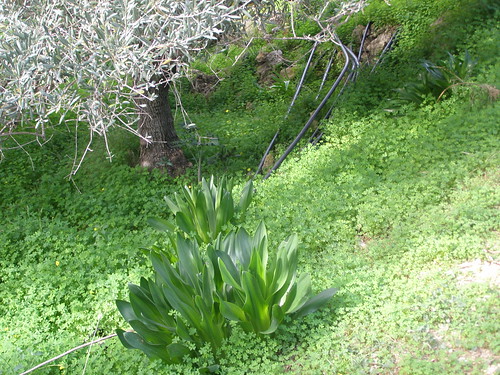Every culture has some customs which sound perfectly sane and normal to their own people, while those outside of the cultural group, upon hearing about them, may consider them not just strange and peculiar, but utterly ludicrous and absurd. And so it is with the Greek New Year, when we refuse to let anyone enter our house after midnight on New Year's Eve if they are not already inside the house, until our favorite person (or animal) crosses the threshold, performing the annual pothariko (ποδαρικό), the 'first foot' to step inside a house on the first day of the New Year; or when we smash askeletoura (ασκελετούρα), an onion-like flowery tuber, often called a squill in English, on our front doors. Both customs are used to herald good luck for the New Year, and the events of the following 12 months are often blamed on the manner in which these kinky but popular New Year's customs, still practiced today in very similar ways right around Greece, were performed.
Here is the way the pothariko, derived from the Greek word πόδι (pothi), meaning 'foot', was once celebrated in Crete:
The skeletoura (commonly known n English as the squill - both words are related) is seen as a sign of fertility because it is very abundant, and is also associated with immortality:

The squill - (a)skeletoura in Greek - grows in the countryside, almost anywhere. I found these ones in an olive grove near my neighbourhood. They aren't easy to dig up, but I was lucky with the one I pulled out - the soil was very moist. The bulb is quite large, and some still had the dry stalk of the tall feathery flower that grows from their centre. The skeletoura contines to flourish even when dug up, hence its immortality attributes.
The most well known Greek food custom for the New Year is the Vasilopita (Βασιλόπιτα), the New Year's cake with a coin hidden in it - whoever finds it is considered the luckiest person of the year. This is usually made on New Year's Eve and cut up on New Year's Day, with a piece dedicated to each member of the family, as well as God and even the house.
The pomegranate is also one of the most popular symbols of the season. This fruit's association with winter and fertility comes from the story of Persephone, who ate 6 pomegranate seeds during the time she spent in the underworld when Hades captured her. In Greece pomegranate is sold fresh when in season, and it is also imported. Pomegranate juice has come into the market through globalisation. Pomegranate seeds feature prominently in memorial cakes, which explains why they have generally been discriminated against in Greek cuisine, but nowadays you will see them used more often in salads and other savoury dishes, prompted by the latest trends in Greek nouveau cuisine .
*** *** ***Here is the way the pothariko, derived from the Greek word πόδι (pothi), meaning 'foot', was once celebrated in Crete:
"Up until a few decades ago in the villages, the cow would be brought into the house to perform the 'pothariko'. The animal was served bread and other delicacies, as well as specially baked cookies which would be hung onto its horns. It was deemed especially lucky if the animal peed inside the house. In some villages, there was a preference for sheep, and in the village of Kapetaniana, the bells of the whole flock would be blessed at the church. In any case, the animals performing the pothariko were not allowed to be black." (translated from the Greek, from 'The Roots of the Greeks: The Cretans', 2009, Pigasos Ekdotiki - Pegasus Publications)These days, most likely the youngest child in a family will be invited to perform on this auspicious occasion, with a gift of money from the parents'/grandparents' 'good hand' (i kali hera - H Καλή Χερα), another New Year's custom. It really is a burdensome task being the good luck charm for a household, as my father once told me, when he told me about being invited to perform the pothariko in his youth for a rich family: in that year, all the cows this family owned died. From then on, my father never stepped over the threshold of anyone's house on New Year's Day without asking if someone had already done that before his arrival...
The skeletoura (commonly known n English as the squill - both words are related) is seen as a sign of fertility because it is very abundant, and is also associated with immortality:

The squill - (a)skeletoura in Greek - grows in the countryside, almost anywhere. I found these ones in an olive grove near my neighbourhood. They aren't easy to dig up, but I was lucky with the one I pulled out - the soil was very moist. The bulb is quite large, and some still had the dry stalk of the tall feathery flower that grows from their centre. The skeletoura contines to flourish even when dug up, hence its immortality attributes.
"Alexander the Great had discovered the source of the immortal water, which dried up when he filled a beautiful glass vessel with its water. In order for the water to keep its properties, it had to remain a secret. When he returned home, Gorgona, his sister, asked him what was in the bottle, but he wouldn't answer her. The next morning, she woke up before him and opened the bottle. On finding nothing noteworthy in it, she poured the water out of the window, in order to pour something else into the bottle. The water fell onto the skeletoura which was growing below the window, with the result that the plant became immortal, and Alexander remained a mortal." (ibid)It is also used to ward off evil in the coming year. This explains why the skeletoura is seen lying on the ground beside a door, waiting for the New Year to arrive. This plant is found all over Greece in unspoiled territory, field borders and nature spots.
The customary vasilopita (these mass-produced ones were being sold at the INKA supermarket) to welcome the New Year, with 'Christ's bread' (Christopsomo - Χριστόψωμο: a kind of tsoureki) in the background; ours will look and taste a little different this year - one of these cupcakes has a coin hidden in its interior, but nobody knowns which one it is (!).


The most well known Greek food custom for the New Year is the Vasilopita (Βασιλόπιτα), the New Year's cake with a coin hidden in it - whoever finds it is considered the luckiest person of the year. This is usually made on New Year's Eve and cut up on New Year's Day, with a piece dedicated to each member of the family, as well as God and even the house.
The pomegranate is also one of the most popular symbols of the season. This fruit's association with winter and fertility comes from the story of Persephone, who ate 6 pomegranate seeds during the time she spent in the underworld when Hades captured her. In Greece pomegranate is sold fresh when in season, and it is also imported. Pomegranate juice has come into the market through globalisation. Pomegranate seeds feature prominently in memorial cakes, which explains why they have generally been discriminated against in Greek cuisine, but nowadays you will see them used more often in salads and other savoury dishes, prompted by the latest trends in Greek nouveau cuisine .
So what did I achieve in the year that just passed? You know the answer to that question better than I do. I want to thank all my readers from the bottom of my heart for your support throughout my food writing adventures over the past two and a half years. For me, blogging about the food I buy, grow, prepare and cook for my family was a way to get me started in writing, and that's what I want to do now - I want to continue to write, without being limited to food, because there is so much more that I want to write about, which I am sure you will want to read, eventually, that is, when I get it all written down.
Another Christmas/New Year symbol in Greece - the boat. This year it played a poignantly prominent role with the death of 9 sailors, 3 of them Greek, on Christmas Day in a fire on a Greek cargo ship sailing off the coast of Venezuela.
And that's my New Year's resolution: to keep on writing, to inform you, and above all, to keep you entertained. My posting will not be as regular as before, but whenever you look me up, you can rest assured that you will leave with a smile on your face.Wishing everyone a Happy New Year,
With love,
From Hania, Crete
PS: I almost forgot to mention one of the more modern, if outright controversial, New Year's traditions in Crete:

Hubbie talking to the gun shop owner: "So, have you got any blanks left?"
Owner: "Blanks? No, sorry, I've run out, and you know they've been outlawed."
Hubbie: "So, when should I come to pick them up?"
Owner: "In the afternoon."
©All Rights Reserved/Organically cooked. No part of this blog may be reproduced and/or copied by any means without prior consent from Maria Verivaki.






I love your explanations of the traditions surrounding Greek New Year. Your cupcake vasilopita is a great idea Maria. All the best for you and your family in 2010. I look forward to more of your writing.
ReplyDeleteI hope you have a very happy new year, and good luck in your new writing endeavors...
ReplyDeleteBest, MaeFood.blogspot.com
Wow! I get to be the first commentor; hope that means good luck for me. Kali Xponia to you and your family, Maria. I have enjoyed reading your blog so much, and look forward to more!
ReplyDeleteWe never go out on New Year's eve, so it will probably be Manoli the cat who performs the entrance ritual for us. And I will make a vasilopita and put a drachma (for old times sake) in it for good luck.
Happy New Year to you and your wonderful family!
ReplyDeleteΚαλή χρονιά με υγεία, ευτυχία και αγάπη!
ReplyDeleteVassilopita - check. Pomegranates for smashing - check. New Year's dinner planned - check. New Year's resolutions - contemplating.
ReplyDeleteHave a wonderful New Year, Xponia Polla and hgeia above all.
Have a safe and foodie-filled New Year Maria. 2010 is full of possibilities!!!
ReplyDeleteMaria, thanks for the New Years wishes. Have a happy New Year with your family!
ReplyDeleteI wish you by heart my dear friend Maria the best for the year 2010! Happy new year to All of you!
ReplyDeleteHappy happy New Year, dear Maria, and thanks for your awesome blog!
ReplyDeleteI like the stories about the skeletoura. Your new year cake is like our Christmas pudding, but we usually have more than one coin. Happy new year, and happy writing.
ReplyDelete2010 ευχές
ReplyDeleteγια μια χρονιά όμορφη, γλυκιά και δημιουργική!!
καλη χρονια μαρια! ευτυχια και χαρα για σενα και τους αγαπημενους σου!
ReplyDeleteΚαλή Χρονιά! All the best for 2010!
ReplyDeleteKali xronia Maria! May it be filled with good health and happiness for you all.
ReplyDeleteMaria,
ReplyDeleteWonderful post -- and I wish you luck in your new writing endeavors, too!
Have a happy, successful New Year.
Regards,
Cindy